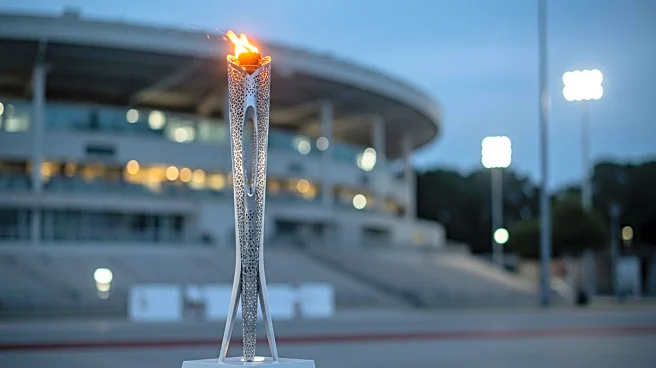What's Happening?
The LA28 organizing committee for the 2028 Summer Olympics in Los Angeles has reached an agreement with the International Olympic Committee (IOC) to allow venues to sell naming rights, marking a first in Olympic history. This decision aims to alleviate logistical challenges, reduce costs, and help cover the budget for the Games. While the field of play will remain free of visible advertising, well-known venues like SoFi Stadium and Crypto.com Arena will retain their names during the Olympics. The agreement allows up to 19 temporary venues to carry naming rights, with existing sponsors given priority. This move represents a shift towards commercialization, balancing financial needs with the traditional values of the Games.
Why It's Important?
The sale of venue naming rights for the LA28 Olympics signifies a significant shift in the commercialization of the Games. This decision could set a precedent for future Olympics, potentially altering the financial landscape of the event. By allowing naming rights, the organizing committee can generate additional revenue to support the privately funded Games, reducing the financial burden on the host city. However, this move also raises concerns about the increasing influence of corporate sponsorship on the Olympics, challenging the IOC's efforts to protect the event from excessive commercialization.
What's Next?
As the LA28 Olympics approach, the organizing committee will continue to negotiate naming rights deals with sponsors. The revenue generated from these agreements will be crucial in funding the Games and ensuring their success. Stakeholders, including sponsors and venue owners, will need to navigate the balance between commercial interests and maintaining the integrity of the Olympic experience. The outcome of these negotiations could influence future decisions regarding venue naming rights in subsequent Olympic Games.
Beyond the Headlines
The decision to allow venue naming rights reflects broader trends in sports and entertainment, where sponsorship deals are increasingly used to offset costs. This development highlights the growing intersection between sports and business, raising questions about the impact of commercialization on the cultural and ethical values of the Olympics. As the Games evolve, stakeholders must consider how to preserve the spirit of the event while adapting to financial realities.








